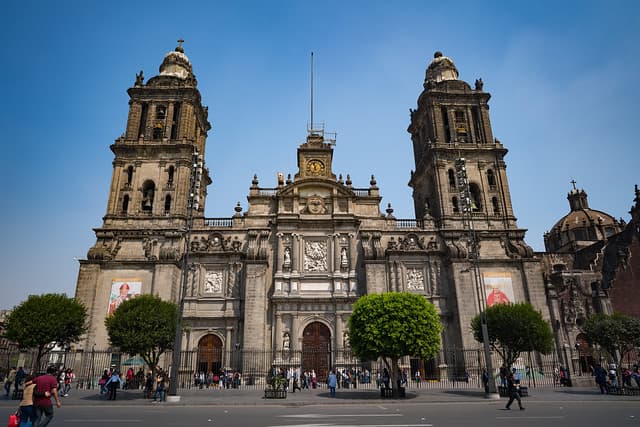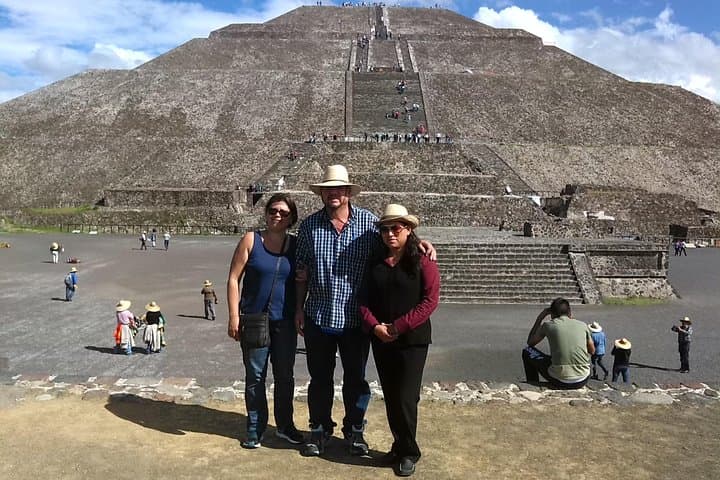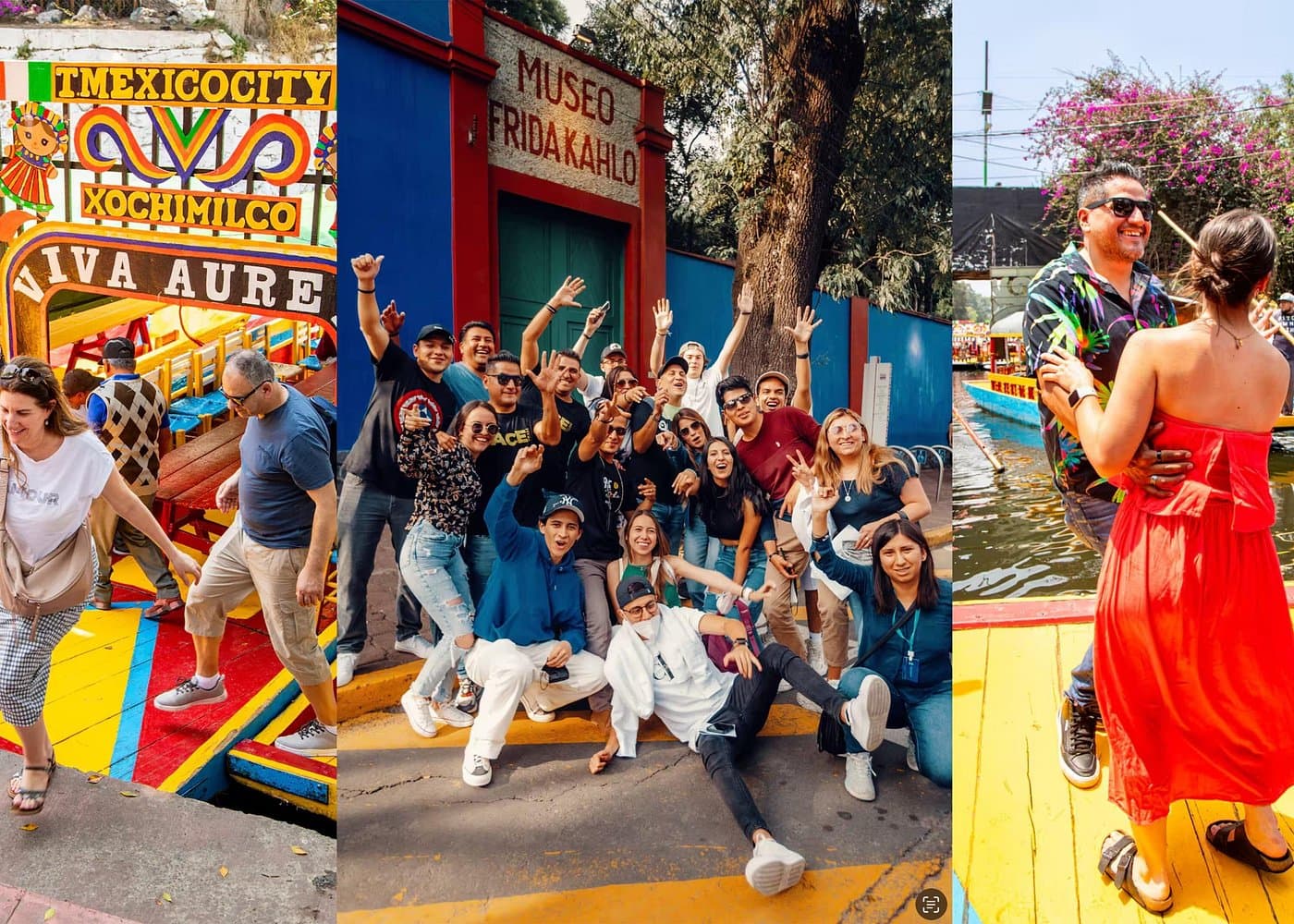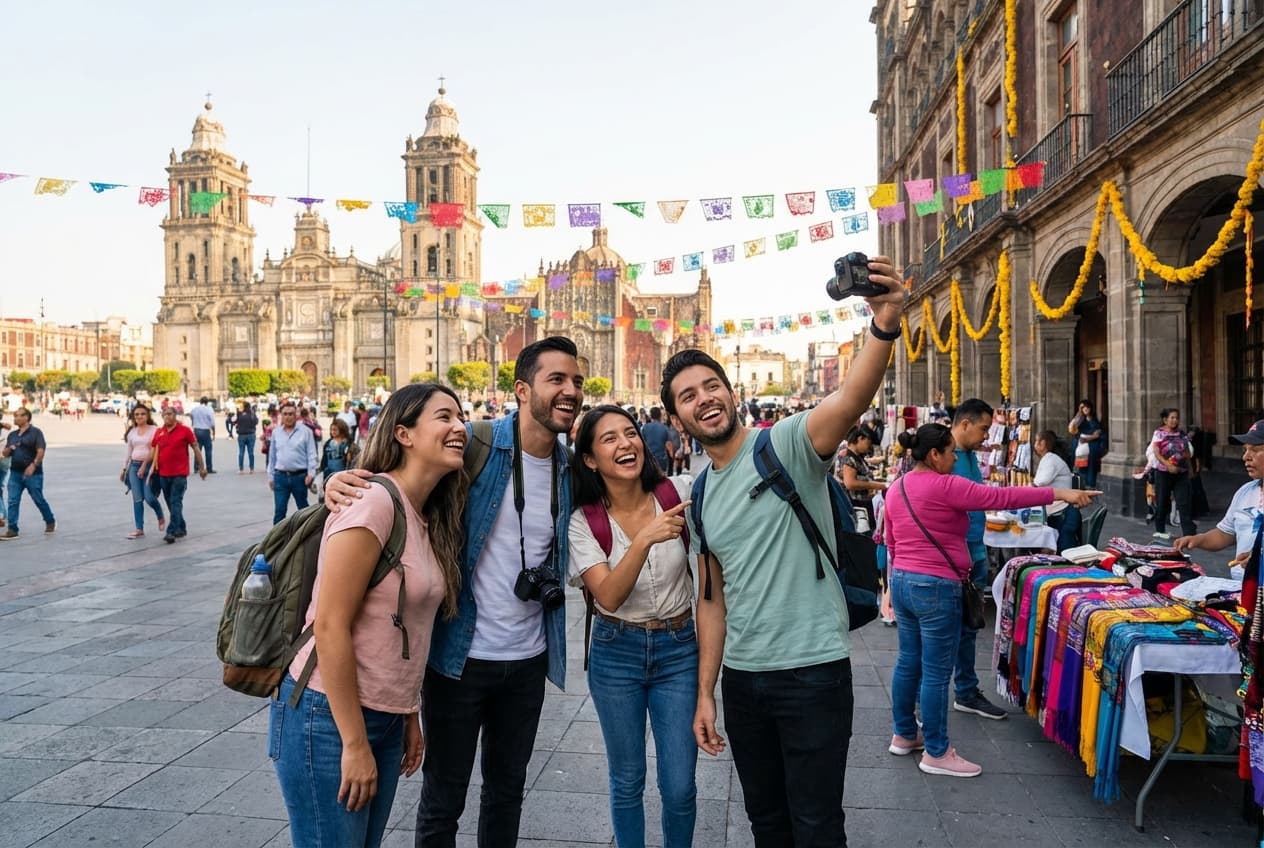Mexico City in 4 Days for Artists - Diego Rivera murals at Palacio Nacional and Palacio de Bellas Artes
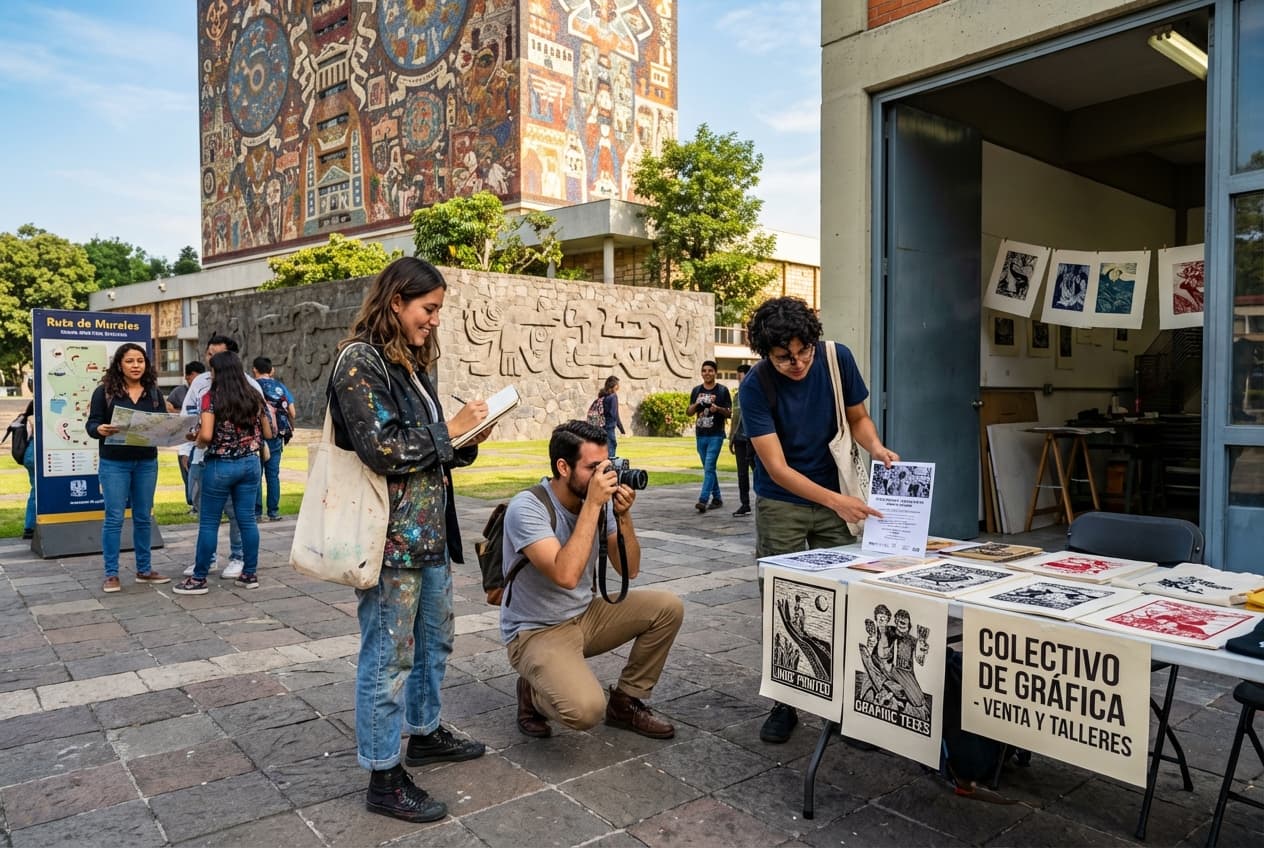
A bold, experimental 4-day route for artists who want hands-on access to murals, print culture, local studios and markets. Focused on authentic, non-touristy encounters — plein air sessions, material hunts, gallery drop-ins and inventive studio spaces tuned to November's autumn light.
Highlights
- Diego Rivera murals at Palacio Nacional and Palacio de Bellas Artes
- Museo de la Estampa — historic and contemporary printmaking
- Roma-Condesa plein air and independent galleries (Galería OMR, Proyectos Monclova)
- Material runs at La Ciudadela, La Merced and Mercado de Coyoacán
- Experimental festivals and shows at Museo Universitario del Chopo and CENART
Itinerary
Day 1
Centro Histórico — historic murals, the print museum, and material foraging at La Merced. Good for getting historical context and sourcing surprising studio supplies.
Diego Rivera murals — Palacio Nacional (morning)
Start with Rivera's civic murals to ground your practice in Mexico City's public mural tradition. Focus on composition, palette and social narrative for sketching and references.
Tips from local experts:
- Arrive at opening to sketch with softer morning light; the grand stairwell and side panels have less foot traffic for drawing.
- Ask security politely to point out lesser-seen panels along the north corridor — guards often know where students set up to draw.
- Carry a thin sketchbook (A4) and a graphite stick — plein-air watercolor can be tough indoors with crowds; graphite captures scale quickly.
Walk transfer to Museo de la Estampa
Short walk through Centro to the national print museum — use the stroll to note façades and small street murals.
Tips from local experts:
- Keep sketches of façade textures on the walk — many small murals and posters are easily missed from a phone snapshot.
- If you carry wet sketches, tuck them into a rigid portfolio; Mexico City's autumn breeze can be brisk.
- Use this transfer to swap batteries/memory cards — good micro-routine between museum visits.
Museo de la Estampa — focused print study
Explore historic and contemporary graphic arts — perfect for studying print techniques, editions and paper handling.
Tips from local experts:
- Ask the front desk about current workshops or visiting printmakers; staff can often connect you to local ateliers.
- Inspect paper stock closely (weight, deckle) and photograph labels — great intel for sourcing similar materials later.
- Take notes on editions, registration marks and inks used — detail photos (without flash) are invaluable for studio practice.
Lunch — El Cardenal (Centro Histórico)
A substantial Mexican lunch to refuel; traditional flavors and solid timing before an afternoon of markets and museums.
Tips from local experts:
- Order something hearty that keeps you moving — late afternoons are for walking the markets and carrying supplies.
- Use the pause to sketch table textures or menu typography as quick warm-up studies.
- If you need a quiet corner to contact local galleries, ask for a less busy table on the terrace or avoid peak rush (12:45–13:30 is usually calmer).
Transfer to Mercado de La Merced — material hunt
Short transfer east to La Merced — the city's most intense supply market for pigments, textiles, brushes and surprising studio ephemera.
Tips from local experts:
- Bring cash in small bills — many stalls don’t take cards and vendors expect to haggle a little.
- Look for stalls selling industrial pigments and repair paints (often labeled 'pintura para retoque') — handy for experimental glazing.
- Ask stall owners about paper remnants and surplus — they often keep offcuts perfect for collage or test runs.
Material scouting — Mercado de La Merced
Dive into stalls for pigments, cheap canvases, brushes, building materials and found objects to incorporate into mixed-media work.
Tips from local experts:
- Head to the back alleys for tool and hardware stalls; those metal bits and frames can transform prints into wall-works.
- Ask for small sample amounts of pigment — vendors will often sell off-cuts if you explain you’re an artist testing mixes.
- Keep packaging for any new materials — vendor names and batch codes help reproduce colors back in the studio.
Transfer to Palacio de Bellas Artes
Move back toward the center for a late-afternoon mural and fresco session — good time for golden-hour interior light.
Tips from local experts:
- Use transport during off-peak windows (15:00–15:30) to avoid rush-hour; an app taxi is the most direct between markets and the Centro.
- Keep samples from La Merced stored flat — slip them inside a folder to avoid folding on the ride.
- Use the transfer to pick a sketching medium for the next session — charcoal handles interior drawings well.
Palacio de Bellas Artes — murals & fresco techniques
Study Rivera, Siqueiros and Orozco works and their fresco/installation approaches. Great for compositional and scale experiments.
Tips from local experts:
- Focus on edges and transitions for fresco technique study — take close notes on layering and pigment intensity.
- Ask museum staff about conservation notes displayed near works — conservation labels often mention original palettes/techniques.
- If you plan to paint large pieces later, photograph scale markers (windows, columns) to reference human proportions.
Evening break — Café de Tacuba (reflect & sketch)
A historic café to decompress, edit photos and make quick compositional studies from your day.
Tips from local experts:
- Use the downtime to sequence reference photos; label images by wall or vendor for later cataloguing.
- Sketch thumbnails of murals you saw and plan one focused piece to experiment with back in your studio.
- If you want an off-hour conversation with a curator or vendor, evenings are good to send messages and set meetings for later in the week.
Day 2
Roma & Condesa — independent galleries, plein air at Plaza Río de Janeiro and Mercado Medellín for color & ingredient hunting.
Plein air sketching — Plaza Río de Janeiro (morning)
Set up in the cool November morning to capture the plaza's baroque architecture and sculptural details — ideal for tonal studies.
Tips from local experts:
- Bring a portable stool and a toned ground; the November light is crisp and mid-morning shadows are sharp for value studies.
- Morning is quieter for on-street drawing — locals walk dogs early, so you’ll have uninterrupted stretches.
- Buy fresh coffee nearby to stay warm — small cafés around the plaza welcome artists nudging into corners to sketch.
Transfer to Galería OMR (short walk/taxi)
Move into Roma Norte's gallery corridors; a quick transfer to OMR keeps the day tight and exploratory.
Tips from local experts:
- Walk if weather's clear — you'll pass small murals and print shops worth quick stops.
- If carrying wet work, use a rigid portfolio bag to avoid smudges during the transfer.
- Ping the gallery beforehand if you want to request a brief curator talk or view works in non-public storage.
Gallery visit — Galería OMR
Contemporary shows and artist-run energy — look for local print editions and ask about visiting artists.
Tips from local experts:
- Ask staff about smaller press runs or editions — sometimes the gallery holds unpublished prints or contacts for local printmakers.
- Photograph installation details (lighting, hanging) for later translation into installation plans.
- Pick up any zines or small ephemera from gallery shelves — gallery visitors often leave artist multiples for trade.
Lunch — Panadería Rosetta (Roma)
A favored local bakery-café — light lunch, great for regrouping and editing photos while tasting Mexican-bakery innovation.
Tips from local experts:
- Order something shareable and sketch the plate design as a small exercise in composition and color.
- Sit near the window if you want to draw street scenes — lots of artist-traffic in this area.
- Use the Wi‑Fi to reach out to print collectives or to confirm studio visits for later in the day.
Transfer to Proyectos Monclova
Short transfer to another independent space known for emerging print and object-based shows.
Tips from local experts:
- Confirm ahead if there’s a talk or opening — Proyectos Monclova sometimes hosts artist editions during afternoons.
- If you're carrying purchases, consider a small courier bag to keep hands free for viewing work.
- Walk routes between galleries to catch alley murals and sticker art often invisible from the main streets.
Proyectos Monclova — gallery drop-in
Check current projects and small-edition prints; speak to staff about local collaborative print runs.
Tips from local experts:
- Ask if the gallery works with nearby printers — many galleries have favored ateliers and can introduce you.
- Inspect wall labels for edition sizes and printers’ names; good leads to local print studios.
- If an artist is in-residence, ask for a quick studio walk-through — often the best informal learning is peer-to-peer.
Market run — Mercado Medellín (ingredients & color study)
A neighborhood market where produce, spices and imported goods make strong color references and supply sources.
Tips from local experts:
- Capture color studies of produce stalls as quick color-mixing references for palettes.
- Buy spice samples (achiote, annatto) to experiment with natural staining and dyes back at the studio.
- Talk to vendors about baskets and textiles — found packaging can be repurposed into print-collage materials.
Sketching lull — Parque México (late afternoon)
Golden-hour sketching at one of Condesa's green lungs — good for quick tonal studies and people-watching as reference.
Tips from local experts:
- Find a bench facing the Art Deco buildings for architectural rhythm studies.
- Experiment with wet-on-wet ink washes from a small water brush for rapid tonal backgrounds.
- Use public water fountains (if available) to refresh brushes; carry a small towel for spills.
Day 3
Coyoacán & CENART — folk material sourcing, local cafés and a formal studio/workshop visit at the national arts center.
Plein air — Jardín Centenario, Coyoacán (morning)
Sketch the plaza, trees and tilework early; November mornings are crisp with long low light ideal for values.
Tips from local experts:
- Set up facing the kiosk for rhythmic pattern studies of tile and ironwork.
- Try a quick 3-value ink wash to capture November’s cool light and shadows.
- Bring small samples of tape to test on-site for masking experiments if you plan to paint later.
Short walk to Café Avellaneda — coffee & local artist chat
Coyoacán's beloved café: strong coffee, local vibe — a good place to meet Coyoacán-based makers and plan afternoon studio visits.
Tips from local experts:
- Buy a single-origin pour-over and use the cup as a palette wash warm-up — coffee stains are a great tonal test.
- Ask the baristas about nearby printmakers — cafés are informal exchange points for artist contacts.
- Sit near the door to greet arriving locals and catch up on neighborhood gossip about pop-up shows.
Mercado de Coyoacán — folk art & material sourcing
Hunt for handmade papers, natural pigments, wooden stamps and folk templates — great raw material for printmaking inspiration.
Tips from local experts:
- Ask for 'retazos de papel amate' or offcuts — small sheets work beautifully for collagraph studies.
- Buy small craft stamps and carved wooden blocks to adapt into printmaking plates.
- Negotiate bundle deals if buying multiples — vendors often reduce price for several items, good for workshop supplies.
Museo Nacional de las Culturas Populares — craft contexts
Evening contextualization of folk processes; excellent to study motifs, techniques and the exhibition of craft as art.
Tips from local experts:
- Study display labels for material sourcing hints — many exhibits list community or maker names useful for field research.
- Pay attention to mounting techniques; museum displays often reveal ingenious conservation hacks for fragile textiles.
- Look for workshop schedules or visiting artist announcements — these can be open to short participatory sessions in November.
Transfer to Centro Nacional de las Artes (CENART) — studio drop-in
Afternoon studio visit at the national arts complex — book ahead to see print and rehearsal studios, residencies and workshops.
Tips from local experts:
- Contact CENART ahead to request a brief studio walkthrough — many programs welcome artist visitors if arranged.
- Bring digital copies of your work to show — studio directors respond well to concise portfolios when considering collaborations.
- Check the on-site schedule for open workshops; November commonly hosts short courses and residencies you might join for a day.
Day 4
UNAM & alternative institutions — MUAC, Tamayo and Chopo; afternoon mural walks in Doctores and a material round at La Ciudadela to close the week.
MUAC — contemporary university museum (morning)
Start at the MUAC to see contemporary exhibitions from Mexico's university scene — ideas for experimental print and installation work.
Tips from local experts:
- Study mounting systems and plinth construction — MUAC often has ambitious installations you can learn from.
- Note curatorial texts and bibliographies for leads on local print projects and artist-collaboration networks.
- If the museum schedule allows, attend a gallery talk — students and curators are key contacts for studio visits.
Transfer to Museo Tamayo
Short transfer across Chapultepec for Tamayo's international collection and its dialogues with Mexican modernism.
Tips from local experts:
- Cross the park to absorb landscape compositions — Tamayo benefits from a quick outdoor visual reset between museums.
- Use the transfer time to sort reference photos and tag them by artist to keep research organised.
- Look for small editioned publications in the Tamayo shop — often limited prints or catalogs that reference local studios.
Museo Tamayo Arte Contemporáneo — midday exhibition visit
Explore international and Mexican artists in a compact modern collection for formal and conceptual prompts.
Tips from local experts:
- Make small quick studies of Tamayo’s palette choices — his color handling is a non-obvious source for contemporary mixes.
- Ask the desk about recent acquisitions linked to print and edition practices — museum educators can suggest contacts.
- If you want to work on a portfolio piece inspired by what you see, use museum benches for short concept-sprints (sketch + 10-minute notes).
Transfer to Mercado de Artesanías La Ciudadela
Head to La Ciudadela for hand-made paper, craft tools and small material discoveries — great final shopping stop.
Tips from local experts:
- Carry a collapsible tote for purchases; many vendors pack materials into tubes or folded bundles.
- Ask for recommendations for specific papel makers or local binders — vendors often point to lesser-known suppliers.
- Avoid peak midday crowds (if possible) — November is moderate, but early afternoon can be busiest.
La Ciudadela — material shopping & final purchases
Choose papers, tools, stamps and small found objects to bring home — a closing shop for everything learned on the route.
Tips from local experts:
- Buy a few sample sheets of different handmade papers — test them immediately with a small ink swatch to note absorption.
- Look for small carved stamps and metal type for future print runs; bargain for mixed lots.
- Keep receipts and vendor names; many will ship larger quantities if you contact them after returning home.
Museo Universitario del Chopo — alternative exhibitions (afternoon)
Explore experimental shows and independent curatorial projects — Chopo's programming is often edgy and locally connected.
Tips from local experts:
- Check the Chopo's event board for late-afternoon artist talks or zine fairs — perfect places to meet local printmakers.
- Bring business cards or small multiples to trade — Chopo audiences are generally receptive to swaps.
- Photograph exhibition layouts (without flash) to note installation strategies for non-traditional spaces.
Doctores / Álvaro Obregón mural walk — late-afternoon street art
Doctores and stretches of Álvaro Obregón carry fresh murals and paste-ups — finish the week with direct street references.
Tips from local experts:
- Plan your walk between 16:00–17:30 for the last warm light on mural surfaces — good for photographing textures.
- Respect residents and private walls — photograph from public sidewalks and ask for permission when feasible.
- Make quick rubbings of interesting textures (stone, rusted metal) on sample paper for collage later.
Transfer & closing reflections — El Péndulo Condesa (drinks and networking)
End with drinks, zines and a debrief — pick contacts, decide which leads to follow up and plan studio experiments based on the week.
Tips from local experts:
- Bring a small selection of your week’s quick prints/zines to trade or show colleagues — El Péndulo attracts creative types who enjoy exchanges.
- Make 3 concrete follow-up actions (email one gallery, order materials, schedule a studio day) and write them down now.
- If your trip continues, ask local artists in the café for short studio-share options — many artists sublet bench space by the day.
Itinerary Attributes
| Days | 4 |
| Highlights | 5 |
| Season | - |
| Month | - |
| Persona | Artists |
| Transfers | 7 |
| Restaurants | 2 |
| Total Activities | 23 |
| Total Places | 23 |
| Activities Types | Culture, Transfer, Restaurant, Shopping, Break, Outdoor, Meal, Experience, Neighborhood |
